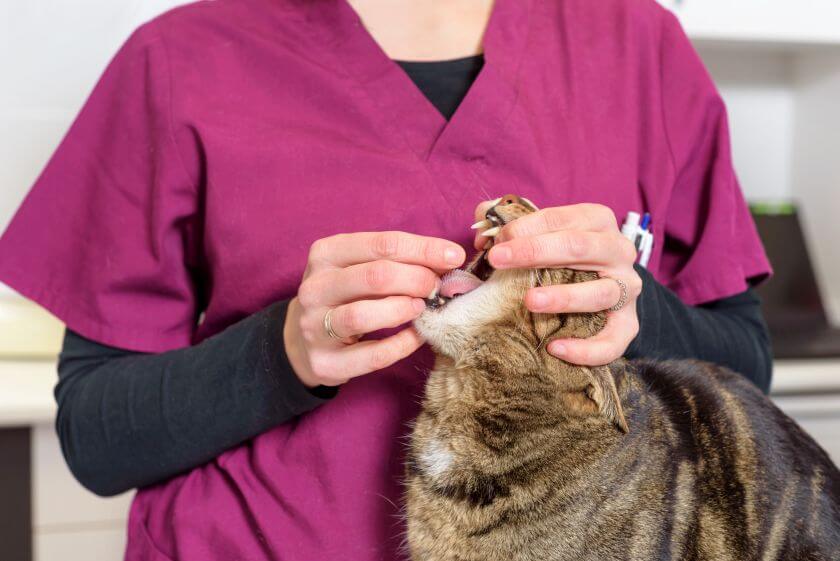When a kitten comes into your home, a visit to the vet is essential. The very first contact with the office results in deworming the pet. Children of cats are particularly vulnerable to diseases related to parasite attacks, but worming cats should also be obligatory in the case of adult cats. Neglecting this can have distressing consequences not only for your pet, but also for you.
Cat deworming – when?
Small cats should be groomed as soon as possible. If cat newborns have appeared in your home, the first deworming should be carried out around the third or fourth week of life. Babies can become infected with worms by drinking their mother’s milk. In addition, they are very vulnerable to the attack of parasites that exist in the environment. Diseases caused by worms lead to exhaustion, anemia, deterioration of general health, and in extreme cases – even the death of a toddler.
Deworming is necessary before each vaccination. This is because parasites can have a debilitating effect on the immune system. Consequently, it will not be possible to generate adequate immunity through vaccination. So we deworm the kitten exactly one week before the first and second vaccination.
How often do you deworm a cat?
Many keepers wonder when to recover a cat that is already grown up. If we accept an adult specimen under our roof, which we know that has not been vaccinated or dewormed before, it should be done immediately after the pet comes to its new home. In this case, the principle is the same as for small cats – it is best if the animal is first dewormed, and after a week vaccination may take place.

Deworming is an activity that should be repeated regularly for both indoor and outdoor cats. Parasites live in the environment and are very resistant, so we can bring them home even on shoes. Cats can easily become infected with parasites from domestic dogs that bring them from a walk. Outgoing cat deworming should take place every three months, while non-walking cat – every six months.
More and more veterinarians and caregivers point out that the deworming pills are burdensome for the body. Therefore, in order not to administer them unnecessarily, regular stool examinations are recommended to diagnose possible parasites. If they are absent, cats do not need to receive tablets.
What are the symptoms of a cat’s worming?
Sometimes even routine deworming will not protect your cat from attack by parasites. If there are symptoms of worming between examinations, it is worth consulting a doctor in order to take appropriate steps.
One of the most characteristic symptoms is the physical presence of parasites. They appear in an animal’s feces and even vomit. Most often they are thin, round, light-colored roundworms. Tapeworm infection occurs much less frequently, but it cannot be ignored. Cats most often become infected with … fleas, which is why mostly free-living or outdoor cats are exposed to it. The tapeworm members are excreted in the faeces.

Your cat may be a victim of parasites if you notice the following symptoms:
- lack of appetite
- apathy and sadness
- dullness of the coat
- diarrhea (sometimes with blood and mucus in the stools)
- visible third eyelid
- weight loss
- anemia (with very high worming)
- breathing problems (when the roundworm settles in the lungs).
In many cases, infection with parasites can be completely asymptomatic, so periodic faecal examination is highly recommended.
Cat deworming pills or maybe another method?
Usually, means for de-worming cats are used by veterinarians in a very general way. Cats get those that target a large number of parasites and are usually effective. However, it is worth noting that periodic parasitological examination of the stool allows to determine exactly which worms have attacked the animal’s organism. Thus, selecting the appropriate means is simple and very effective.
Collecting stool samples for testing is not difficult. You will need sterile cups (available at a pharmacy) for this. It is best to collect samples from a few days (usually three, but the doctor will clarify this) and store them in the refrigerator until they are brought to the clinic. You do not need to remove litter from the samples.

Types of remedies for cat deworming
Many people believe that cat worming remedies can be purchased at a pet store. The truth is, however, that only a veterinarian can choose the right product and its dose. Performing a stool test allows you to find out what exactly the parasites have attacked your pet and thus choose the appropriate treatment method. Currently, the most popular of the measures used are:
- pills for cat deworming
- drops applied to the neck (they mainly act on external parasites)
- deworming pastes.
Cats found on the street and those infected with tapeworms usually undergo complex anti-parasite therapy. At the same time, they are given a tablet or paste and drops on the nape of the neck. This allows you to get rid of external and internal parasites at the same time.
How to back the cat in extreme cases?
Very strong worming is dangerous to the health and life of the cat. The therapy should then be very thoughtful, because poisoning a large number of parasites at the same time can have extremely unpleasant consequences. Dead worms (especially roundworms) can clog the intestines and thus block the digestive system.
The decaying bodies of the parasites secrete toxins that, in extreme cases, can cause shock and lead to the cat’s death. So how do you act in such situations? First of all, then the standard dose of a deworming agent, i.e. one based on the cat’s weight, is not used. In such cases, treatment lasts for three days, during which the cat is given one third of the standard dose each day. The elimination of parasites can be helped by giving the cat paraffin oil in a small amount.
Regular cat worming is the key to good health and long life of your pet. For indoor cats, it is sufficient to take a stool sample for examination every six months. This will allow you to assess whether your cat is infected with worms, and if so, to choose an appropriate treatment method.

